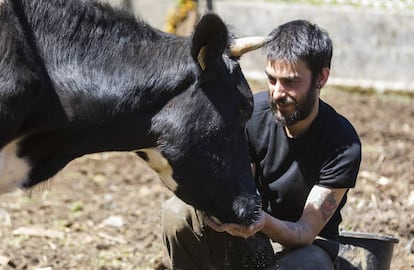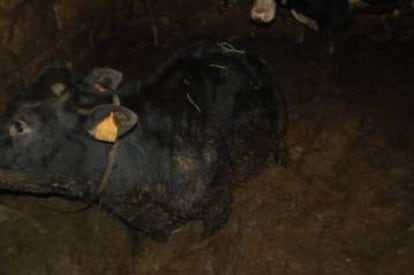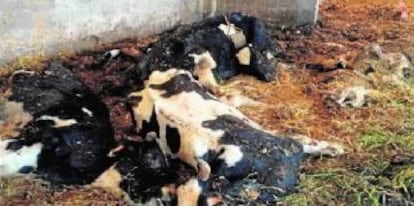When heaven is a green field for a Spanish donkey
Spain’s legal system is still failing to tackle animal abuse, say rights activists


“Fernando loves being kissed. He appreciates being loved so much that sometimes he cries when you stroke him,” says Abigail, the co-founder of the Mino Valley Farm Sanctuary in O Saviñao, Lugo.
It’s a far cry from the days this donkey spent tied up with nothing to eat or drink and with no means of escape from attacks by other animals that ripped at his shanks. Now, just a mile or so down the road, Fernando is treated like a king by Abigail and her partner Mike Greer, who between them set up Mino Valley four years ago on 40,000 square meters of land in Ribeira Sacra, Galicia. The refuge is now home to 200 animals, from sheep to hens, each with their own name and past involving cruelty and neglect, although as Abigail admits, “it’s hard to tell one hen from the other.”
In little less than five years, 10 animal sanctuaries like Mino Valley have sprung up across Spain. Typically run by vegans, the animals run free, their milk is reserved for their young, and they are protected from abuse by humans.
Although animal refuges are registered charities,Spanish law treats them as though they were income-generating farms
Sanctuaries such as Gaia in Camprodon, Girona, or Wings of Heart in Madrid, which typically shelter between 100 and 300 animals, have as many supporters abroad as they do in Spain. But although they are registered charities,Spanish law treats them as though they were income-generating farms.
Refuges are run by a handful of volunteers and funded by animal adoption schemes, members’ subscriptions and donations that come, as often as not, from abroad. They also have online vegan shops, but the expense of maintaining the animals is enormous – Ismael López and Coque Fernández, the founders of Gaia, say their monthly costs come to around €10,000.
But while more and more sanctuaries are opening, animal rights groups say the law is not doing enough to protect animals. For example, there was no legal recourse when 10,000 farm animals “were allowed to die” in the River Ebro floods in March 2015, or when a lorry carrying 804 two-month-old pigs crashed in La Rioja, killing all but 150. Of these, the activists were able to save just 16 from slaughter, among them Leticia, Xita and Raúl, who are now all living at Gaia.

The sanctuaries are a testament to the extremes of human cruelty and kindness visited upon animals by Spaniards; they shelter piglets with spinal injuries caused by overcrowding and poor transportation that are now moved about in wheelchairs. There are goats that receive daily physiotherapy sessions before being taken back to the field in a pram. There are hens that have lost their feathers that now wear woollen waistcoats. And then there are animals that have been rescued from certain death at local fairs – sheep that have been saved from wolf pits or dumpsters; ducks, rabbits and many Vietnamese pigs once made famous by celebrities like George Clooney which, after being used as toys, have been tossed aside.
The Geers are looking for another plot of land so they can continue to save animals, but say they don’t have a lot of time. Between them, they have to build wooden huts to house the three new members of the family who are waiting in Vacaloura, de Santiago, another nearby sanctuary, while their homes are being prepared.
There are also two cows and a bull being given refuge in O Saviñao while their cases go through the courts. They were rescued with 13 others from a neighboring farm in Boiro where they were kept in horrendous conditions. Ropes a meter in length kept them anchored in a lake of excrement and prevented them from changing position. The overcrowding was such that there were even cases of deformed nasal passages. When the Galician animal rights group Vox Ánima finally sounded the alarm, the bulls’ horns were found to have turned to shell because the ropes tying them down had stemmed the blood flow. They also found the cows had spent the winter at the side of the road while their calves were inside the farm buildings, steeped in slurry.
In March, in the space of a week, there were three separate reports of animal neglect in Galicia, including the Boiro case. The other two were discovered in the tiny communities of Chantada and Friol in Lugo province, where farmers had allowed almost 100 cows to perish in terrible conditions.

By the time the authorities arrived, the farmer in Friol had burned his dead livestock, but not the farmer in Chantada. Now in the hands of the police, the photos of what happened there are disturbing. The police counted 39 dead animals, although some of the remains were in such a state of decay that it was hard to exact. Others were found lying in pools of slurry.
A few days later, the story hit the headlines, triggering controversy in this largely rural northwestern region. The Galician regional government was keen to separate the nightmarish revelations from the ongoing problem of falling milk prices that are putting more and more farmers out of business. When questioned by reporters, officials said rigorous inspections had been carried out. Meanwhile, labor unions were divided on the issue; some took the official line, while others criticized policies that are doing nothing to help farmers.
At the same time, animal rights groups attempted to draw attention to the plight of farm animals by protesting in front of the slaughterhouse where the cattle that had been rescued from Friol and Chantada were taken.
On the night of April 20, activists came from all over Spain to try to prevent these unfortunate beasts being slaughtered, but to no avail. The last bull in Friol, which was completely healthy, survived until a week ago while his case was being reviewed within the slaughterhouse.
Unless an animal is confiscated by the authorities, the owner can still decide its fate; that is as long as a government inspector doesn’t give the order to slaughter it on health grounds. Animal rights activists in the region are on high alert. Groups such as Libera warn that more cases of abuse are about to be exposed, with some raising fears that behind the gross neglect is “an attempt to cash in on economic compensation.”
The same day the bull from Friol met his end, the farmer from Chantada appeared in court. The case against him was brought by one of the few lawyers in Spain specializing in animal rights, Victor Valladares, who pressed charges on behalf of the Provegan Foundation and three of the biggest animal refuges in the country – Gaia, Wings of Heart and Hogar Provegan in Tarragona. According to Valladares, a report written two weeks earlier hadn’t reached the court in Chantada, and the regional government of Galicia had ordered the slaughter of the surviving livestock so hastily that the vets working with the animal rights groups had no time to gather relevant evidence.
In court, the farmer testified that his animals died from a bacterial infection that wiped them out in the space of five days. His financial problems had forced him to use bad feed, he said. But animal rights groups say there is no evidence to back up the claim. They are demanding a two-year prison sentence and aim to file charges against the Galician regional government once they have gathered enough evidence.
English version by Heather Galloway.
Sign up for our newsletter
EL PAÍS English Edition is launching a weekly newsletter. Sign up today to receive a selection of our best stories in your inbox every Saturday morning. For full details about how to subscribe, click here.
Tu suscripción se está usando en otro dispositivo
¿Quieres añadir otro usuario a tu suscripción?
Si continúas leyendo en este dispositivo, no se podrá leer en el otro.
FlechaTu suscripción se está usando en otro dispositivo y solo puedes acceder a EL PAÍS desde un dispositivo a la vez.
Si quieres compartir tu cuenta, cambia tu suscripción a la modalidad Premium, así podrás añadir otro usuario. Cada uno accederá con su propia cuenta de email, lo que os permitirá personalizar vuestra experiencia en EL PAÍS.
¿Tienes una suscripción de empresa? Accede aquí para contratar más cuentas.
En el caso de no saber quién está usando tu cuenta, te recomendamos cambiar tu contraseña aquí.
Si decides continuar compartiendo tu cuenta, este mensaje se mostrará en tu dispositivo y en el de la otra persona que está usando tu cuenta de forma indefinida, afectando a tu experiencia de lectura. Puedes consultar aquí los términos y condiciones de la suscripción digital.








































